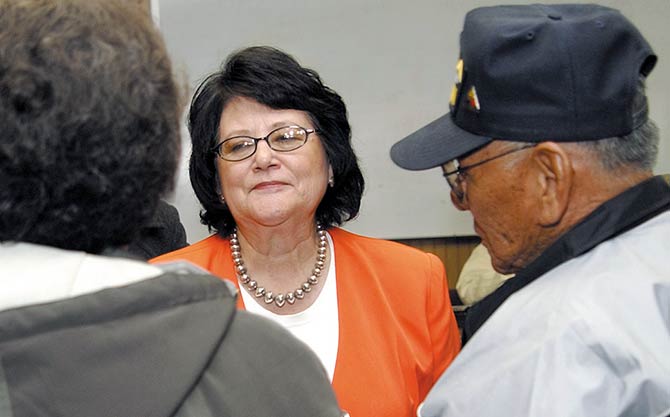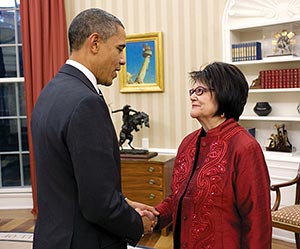Cancer claims Cobell, warrior of the people

(Times photo - Paul Natonabah)
Elouise Cobell, center, chats with local Navajos before giving an update on the trust lawsuit at Nageezi Chapter House on April 5, 2004.
By Cindy Yurth
Tséyi' Bureau
CHINLE, Oct. 20, 2011

(Courtesy photo - Pete Souza/White House)
President Barack Barack Obama meets with Elouise Cobell in the Oval Office on Dec. 8, 2010. )
She probably never dreamed she would be one of them.
Cobell died of complications of cancer at 65 on Oct. 16.
She was diagnosed shortly before a federal judge on June 20 heard evidence to finalize a $3.4 billion settlement of the case, which accused the federal government of failing to account for billions in Indian assets it held in trust over the last century.
The case is currently tied up in four different appeals (a fifth has been dropped), and it could be years before account holders, including an estimated 30,000 to 40,000 Navajos, see a dime.
Ervin Chavez, president of the association of Navajo allottees known as Shi Shi Keyah, got to know Cobell when she visited Navajo to gain input on the litigation.
He was at first surprised by her soft-spoken demeanor.
"Because of what she was doing, people pictured her as coming out real strong," he said. "She wasn't like that. She was very soft-spoken. She could bear down on a point she was making, but she never did it in an impolite way. It was more like she stayed after it to make sure you understood what she was saying."
Chavez said Cobell's concern for the elders was real.
"When she would come out here, she would sit down with the elders and just talk with them, get to know them," he recalled. "She was real patient with people. When she shared a meal with my wife and I, she never talked about the case. She would talk about her ranch, her husband, her family."
Chavez said he is planning to attend Cobell's funeral this weekend in her hometown of Browning, Mont., in the land of her Blackfeet people.
"She fought a fantastic fight for herself and for her people," he said. "As a Native American I will be forever proud of her and thank her. Her work here on earth will continue to be a positive ripple throughout Indian Country for years to come."
President Obama and Assistant Secretary of Indian Affairs Larry Echohawk both issued statements at Cobell's passing, with Echohawk calling her "a champion of human rights" who "spoke truth to power so that justice could prevail.
"Through her legacy, individual Indians will have more control over their lands, and many American Indians and Alaska Natives will be able to pursue higher education through the scholarship portion of the settlement," he wrote.
President Obama, under whose administration the suit was finally settled, wrote: "Elouise helped to strengthen the government-to-government relationship with Indian Country, and our thoughts and prayers are with her and her family and all those who mourn her passing."
Cobell was a great-granddaughter of the Blackfeet leader Mountain Chief.
While she will forever be known as the Cobell of Cobell v. Salazar, she was also a successful rancher and one of the founders of the Native American Bank.
She was a former tribal treasurer for her tribe, and it was during her 13 years in that capacity that she unearthed the shoddy bookkeeping that led her to investigate the government's handling of Indian assets.
She was a trustee for the National Museum of the American Indian and the Nature Conservancy of Montana.
Among her many awards and recognitions were a "genius grant" from the John D. and Katherine T. MacArthur Foundation (much of which went toward funding the lawsuit), a Cultural Freedom Award, an AARP Impact Award and the Jay Silverheels Achievement Award from the National Center for American Indian Enterprise Development.
Just this year she was named Montana Citizen of the Year by the Montana Trial Lawyers Association.
She graduated from Great Falls Business College and attended Montana State University, from which she later received an honorary doctorate. She also has honorary degrees from Rollins College and Dartmouth College.
Cobell leaves behind her husband, Alvin Cobell of Blacktail, Mont.; a son, Turk Cobell and his wife, Bobbie, of Las Vegas, Nev.; two grandchildren, Olivia, and Gabriella; a brother, Dale Pepion of Browning; and three sisters, Joy Ketah of Seattle and Karen Powell and Julene Kennerly, both of Browning.

